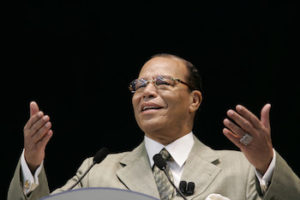
Louis Farrakhan
Louis Farrakhan was born on this date in 1933. He is a Black religious leader in the American Muslim community.
Born in New York City, the younger of two sons of Sarah Mae Manning and Percival Clark, immigrants from the Anglo-Caribbean islands. His mother was born in Saint Kitts, while his father was Jamaican. The couple separated before their second son was born. He was an outstanding Boston English High School student who attended Winston-Salem Teachers College. Farrakhan was an excellent musician; he played the violin and was a calypso singer. As a singer, he earned his livelihood before converting to the Nation of Islam (NOI) in the 1950s. He quickly worked his way up to a leadership position, becoming the minister of the Boston mosque.
He loudly denounced Malcolm X after the latter split with Elijah Muhammad in 1963. He soon assumed leadership of the Harlem mosque, which Malcolm had previously led. After Elijah Muhammad died in 1975, he briefly supported Muhammad's son and designated successor, Warith Muhammad, as leader of the Nation of Islam. Shortly after Warith Muhammad began accepting whites as members within the Nation of Islam, now renamed the World Community of Al-Islam in the West, Farrakhan split from him and established a rival organization with about 10,000 members.
Farrakhan's support for Jesse Jackson's presidential candidacy in 1984 quickly became an issue after Farrakhan made several controversial statements, most notably calling Judaism a "gutter religion." In June 1997, he wrote Jude Wanniski with a public correction of the New York Times article, published on April 5, 2000.
Overshadowed in the controversy was the involvement of Nation of Islam leaders in American electoral politics for the first time. Previously, Black Muslims had generally followed Elijah Muhammad's counsel not to vote or participate in political campaigns. Instead, the NOI encouraged the following: "The so-called Negro in America must elect his political leaders and his own candidates."
In January 1995, Qubilah Bahiyah Shabazz, daughter of slain Black nationalist leader Malcolm X, was arrested and charged with trying to hire an FBI informant to kill Farrakhan, who some believe was involved in the 1965 assassination of her father. Farrakhan publicly defended Shabazz, claiming that the charges were an FBI attempt to entrap her. On May 1, 1995, Shabazz avoided a trial and possible prison sentence by accepting responsibility for the plot. The court ordered her to seek psychiatric counseling, enter a drug and alcohol treatment program, and obtain a steady job.
On October 16, 1995, African American men from across the United States convened in Washington, D.C., for the Million Man March, which Farrakhan organized. Billed as a "holy day of atonement and reconciliation," marchers were urged to improve themselves, their families, and their communities. Those who could not attend the march were encouraged to stay home from work and avoid spending money at businesses to show solidarity with the marchers. Farrakhan closed the march with a two-hour speech in which he condemned the doctrine of white supremacy and claimed that there are still "two Americas, one Black, and one white, separate and unequal." He also challenged the marchers to return home and work to make their communities "safe and decent places to live."
In early 1996, Farrakhan embarked on a controversial 18-nation tour of Africa and the Middle East. During the tour, he visited Iran and Libya, nations the United States government believes support international terrorism. His journey was designed to promote peace and reconciliation, yet U.S. officials widely criticized Farrakhan for several anti-American statements he made while overseas. On the last day of February 2004, he was scheduled to hold a rally in Washington, DC, supporting Reparations.
On October 19, 2008, Minister Farrakhan opened the doors and grounds of Mosque Maryam. This was a Rededication Ceremony themed "A New Beginning." This date also commemorated the 13th Anniversary of the Million Man March and the Holy Day of Atonement. In December 2013, Farrakhan announced that he had not appeared publicly for two months because he had suffered a heart attack in October of that year.
The Encyclopedia of African American Heritage
by Susan Altman
Copyright 1997, Facts on File, Inc. New York
ISBN 0-8160-3289-0